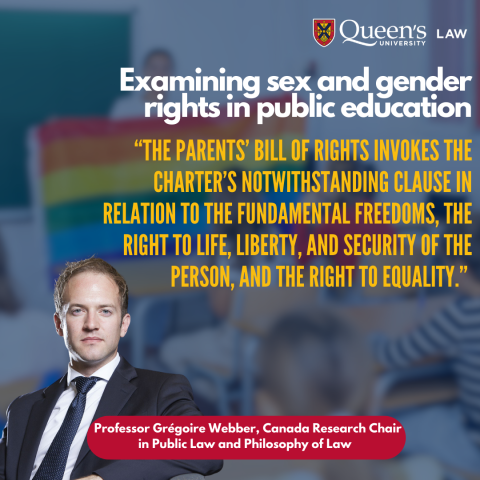
In the past six months Canadians have witnessed increasing tensions around issues related to sex and gender in public education. New policies and laws, alongside protests about them, raise important questions about the respective roles – and rights – of teachers, schools, provincial education ministries, parents and children in deciding how these issues will be addressed. Through this new insight series, Queen’s Law faculty members will explore some of these questions through the lens of human rights law and the Charter.
In October of last year, Saskatchewan enacted the Parents’ Bill of Rights, thereby joining a number of other provinces with measures on how gender identity will be dealt with in public schools in Saskatchewan. This legislation was immediately met with protest and claims the law would negatively impact transgender students. To avoid a constitutional challenge to its law, Saskatchewan invoked the notwithstanding clause in the Canadian Charter of Rights and Freedoms. This clause allows a law to continue operating even though it might violate some rights guaranteed by the Charter.
In the first part of a four-part series, Professor Grégoire Webber, Canada Research Chair in Public Law and Philosophy of Law, explores whether this strategy was successful or if courts can still evaluate whether the Parents’ Bill of Rights violates Charter rights and freedoms.
It was a sophisticated ruling and an affirmation of the value of legal scholarship’s contributions to our law’s development: in UR Pride Centre for Sexuality and Gender Diversity v Saskatchewan, 2024 SKKC 23, the Court of King’s Bench ruled that the province’s recourse to the notwithstanding clause does not prevent a court from ruling on a law’s compliance with the rights and freedoms of the Canadian Charter of Rights and Freedoms.
On October 20, 2023, the legislature of Saskatchewan enacted The Education Act (Parents’ Bill of Rights) Amendment Act, key provisions of which deny a pupil younger than 16 years of age the choice to identify at school with a new gender identity or a gendered-related preferred name without the consent of the pupil’s parent or guardian.
The legislation invokes the Charter’s notwithstanding clause in relation to the fundamental freedoms (s. 2), the right to life, liberty, and security of the person (s. 7), and the right to equality (s. 15).
UR Pride, which had commenced Charter proceedings against a government policy predating the legislative enactment, sought leave to amend its action to seek, among other remedies, a declaration from the court that the enactment violates ss. 7 and 15 of the Charter.
In reply, the Attorney General of Saskatchewan sought a “complete dismissal” of the proceedings.
The province argued that the notwithstanding clause “completely removes the legislation from judicial review”, that the court was now “without jurisdiction” to determine violations of rights targeted by the clause, and that it would amount to “judicial activism” for a court to rule legislation’s compliance with rights.
Drawing on recent academic contributions on the notwithstanding clause (summarized here and here), Justice Megaw ruled that the notwithstanding clause does not deny a role for courts in evaluating whether legislation complies with Charter rights and freedoms.
Core aspects of Justice Megaw’s reasons draw on arguments defended in Webber, Leckey, and Mendelsohn 2019; Webber 2021; and Leckey and Mendelsohn 2022.
Justice Megaw’s reasoning relies on (1) the wording of the notwithstanding clause, noting that the clause does not “include any words which could be interpreted to remove the jurisdiction of the court”; (2) the importance of ongoing access to judicial review; and (c) the importance of declaratory judgments.
With this 16 February 2024 ruling of the Court of King’s Bench, it is the second time that a court has affirmed that it has jurisdiction to determine whether legislation violates Charter rights and freedoms targeted by the notwithstanding clause (for the first, see Hak v Quebec, 2021 QCCS 1466).
Two weeks later, on 29 February 2024, the Quebec Court of Appeal came to a different conclusion, affirming that the notwithstanding clause denies any such role for a court (see Hak v Quebec, 2024 QCCA 254).
It is expected that the matter will eventually find its way to the Supreme Court of Canada. Our final court of appeal will determine whether the notwithstanding clause provides for more than the guarantee that legislation will remain in effect no matter its compliance with rights and freedoms. Two courts have determined that the notwithstanding clause is not so powerful as to deny a court the jurisdiction to declare that rights have been violated by a legislature whose responsibility is to protect all rights for all persons. Another court has taken a different view. Only one of those conclusions can be right.